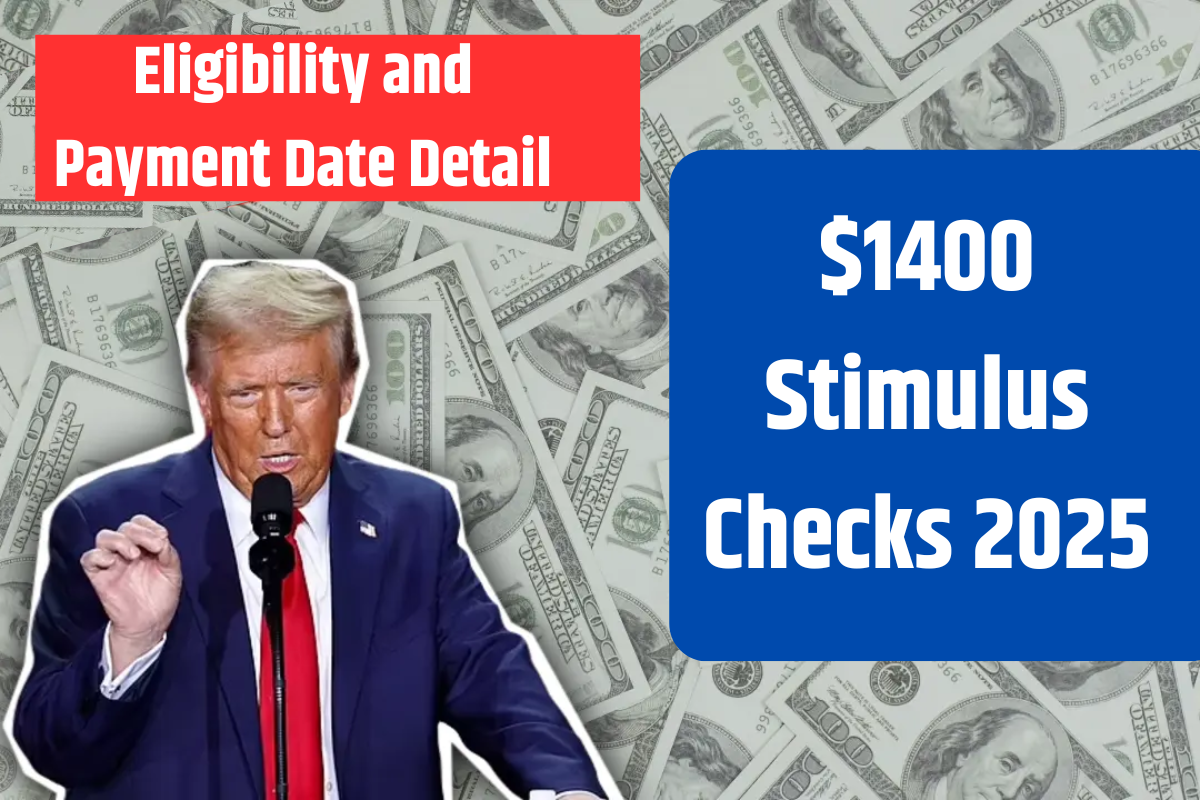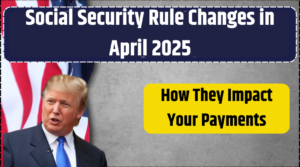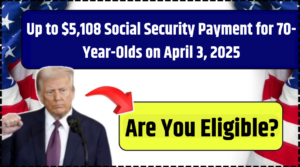In 2025, the U.S. government is rolling out a crucial measure to assist citizens during challenging times: the $1400 Stimulus Checks. This financial support aims to ease the burden of rising living expenses, including deflation and job losses, as part of an ongoing effort to boost the economy. However, understanding the eligibility requirements and application process is essential to ensure that individuals can access this much-needed assistance.
What is the $1400 Stimulus Check?
The $1400 Stimulus Check is one of the relief measures designed to provide direct financial aid to eligible U.S. residents. This program is part of a broader strategy to manage economic hardship, particularly for those facing financial instability. While the IRS has already distributed several rounds of payments in the past, the 2025 round of checks is expected to provide the same benefits, ensuring citizens can manage the impact of economic challenges more effectively.
The IRS will deliver the $1400 payments to qualifying individuals via direct deposit, mailed checks, or prepaid debit cards, depending on the payment method chosen. Here’s what you need to know about eligibility and how to apply.
Eligibility Criteria for the $1400 Stimulus Check
To qualify for the 2025 $1400 Stimulus Check, applicants must meet specific criteria set by the IRS. These requirements are designed to ensure that the financial aid reaches those who need it most.
- Residency and Citizenship: You must be a U.S. citizen or a legal resident living in the U.S.
- Tax Filing: Eligible applicants must have filed their tax returns for either 2022 or 2023.
- Income Limits:
- For individual taxpayers, the gross annual income must not exceed $75,000.
- For married couples filing jointly, the combined income must stay under $150,000.
- Heads of households can earn up to $112,500 annually.
- Dependents: Applicants must have at least one dependent under the age of 17 to qualify for the payment.
- Disability or Blindness: Disabled or blind individuals are also eligible to apply for the stimulus payment.
How to Apply for the $1400 Stimulus Check
Applying for the $1400 Stimulus Check is straightforward, but applicants must ensure that they meet the necessary requirements before submitting their application.
- File Your Taxes: Ensure that your tax returns for 2022 or 2023 have been filed with the IRS.
- Visit the IRS Website: Go to the official IRS website at www.irs.gov.
- Confirm Your Eligibility: Check the eligibility guidelines and confirm that you meet the criteria.
- Submit Your Application: Complete the application form, providing necessary details such as your Social Security Number (SSN) and other legal documentation for verification.
- Review and Submit: Double-check your application to ensure accuracy before submitting it.
Distribution Methods for the $1400 Stimulus Check
Once your application is processed and approved, you’ll receive your $1400 Stimulus Check through one of the following methods:
- Direct Deposit: The most common method, where the payment is directly transferred into your bank account.
- Mailed Check: If direct deposit information is unavailable, the IRS will mail you a physical check.
- Prepaid Debit Card: In some cases, a prepaid debit card may be issued, which can be used for purchases or cash withdrawals.
How to Track Your Stimulus Payment
After applying, you can track the status of your payment through the IRS website. Here’s how:
- Go to the IRS Website: Visit www.irs.gov.
- Log In to Your Account: Access your personal IRS dashboard.
- Use the “Get My Payment” Tool: Locate the tool on the homepage and enter the required details.
- Check the Status: The application will display the status of your payment, including any updates.
Frequently Asked Questions (FAQs)
1. Who is eligible for the $1400 stimulus check in 2025?
Eligibility for the $1400 stimulus check in 2025 will likely be based on income, family size, and filing status. This could include individuals, couples, and families that meet specific income thresholds. The final eligibility requirements will depend on legislation passed by the government.
2. When will the $1400 stimulus checks be sent out?
The exact dates for the distribution of the $1400 stimulus checks in 2025 are yet to be confirmed. However, payments are expected to begin shortly after any official announcement or legislation is passed. Stay updated on government announcements for specific dates.
3. Will I receive the full $1400 amount?
The $1400 payment is generally designed for individuals who meet specific income guidelines. Those who make above a certain threshold may receive a reduced amount or no payment at all. The amount may also vary for dependents or households with children.
4. How will the $1400 stimulus check be sent to me?
Stimulus payments in the past have been sent via direct deposit, paper checks, or prepaid debit cards, depending on how the recipient receives their tax refunds. If you’re eligible for the payment, ensure that the IRS has your most current banking details to expedite the transfer.
5. Do I need to apply for the $1400 stimulus check?
No, you do not need to apply for the $1400 stimulus check if you’re already eligible. The payment will be automatically issued to those who qualify based on the latest government data from your tax filings or public records.
6. What should I do if I haven’t received my payment?
If you believe you are eligible for the $1400 stimulus check but haven’t received it, check the IRS online tool or call their customer service for assistance. You may need to file a claim or correct information on file with the IRS to receive your payment.
7. Will the $1400 stimulus check be taxable?
No, the $1400 stimulus check will not be taxable. It is considered a form of government assistance and will not count as taxable income on your 2025 tax return.
8. Can I receive the $1400 stimulus check if I am on Social Security, SSI, or SSDI?
Yes, individuals receiving Social Security, SSI, or SSDI benefits are generally eligible for the stimulus payment, provided they meet the income and other requirements set by the government. Be sure to check for updates on specific eligibility for recipients of these benefits.
9. Will the $1400 stimulus check be extended to all U.S. citizens or residents?
Typically, the stimulus check is extended to U.S. citizens and qualifying residents who meet specific income requirements. Non-U.S. citizens and certain other categories may not qualify unless they have legal resident status.
10. What happens if my payment is delayed?
Delays in stimulus payments can happen due to various reasons, including data errors, banking issues, or high volume. If you experience a delay, check the IRS website for updates on payment status and guidance on how to address issues.




